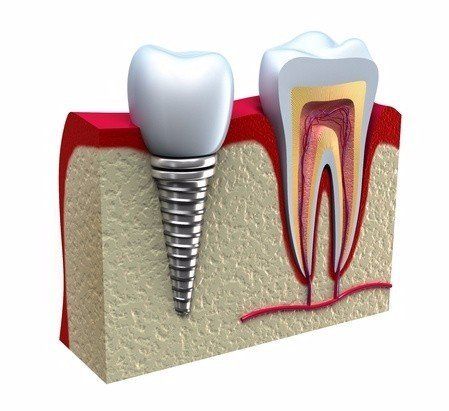What to Know About Your Singular Tooth Implant
When dentists find that
a patient would be a valid candidate for dental implants, even just one, they
refer the patient to a dental specialist, such as an oral surgeon or
periodontist, who conducts a comprehensive exam and reviews both the patient’s
dental and medical history. This specialist then determines if the patient has
any kind of systemic disease that would make dental implants an improbable
option. If no systemic issue exists, the specialist takes x-rays and creates
impressions of the patient’s gum tissue and teeth to provide a precise model.
Singular tooth dental implants are usually recommended for patients who’ve undergone traumatic injury, who didn’t have a tooth emerge in the mouth’s anterior area, or who’ve lost a posterior tooth due to a failed root canal or significant dental decay.
What are Implants?
Implants are metal devices that are surgically set in the jaw bone in order to replace missing teeth. Implants have three parts—the anchor, a metal device implanted into the lower or upper jaw’s bone tissue; the abutment, a metal device attached onto the anchor via a center screw, which also connects the abutment to the third part, the prosthetic device, which can be a bridge, denture, or crown.
Singular Implant Advantages
Singular tooth dental implants are likely preferable rather than a fixed bridge attached to two teeth or more. Other teeth support fixed bridges, requiring dentists to cut normal teeth down to support the cemented bridge. When this happens, the jaw bone can start to resorb and thereby deteriorate. A singular dental implant, however, is placed in the jaw bone to function as the root for a missing tooth, which also helps preserve the jaw bone.
The Surgical Procedure
For a patient’s surgical appointment, their specialist numbs the implant site using local anesthesia, as gum tissue will be sliced and flapped back. The specialist exposes underlying bone before starting to drill into it. Once the bone has a suitable hole, the implant’s anchor is inserted into the site. From there, the flapped gum tissue is put back in place, and the anchor is sutured over. Implants set into the upper jaw take between four and six months to heal while lower jaw implants take between three and six months, given the lower jaw bone is denser than the upper jaw bone.
For the next part of the process, the specialist numbs the implant site before flapping the gum tissue over and exposing the anchor. The abutment is then connected to the anchor, with the gum tissue then set back over the implant, the abutment sticking out, and sutured. The specialist then places a healing cap to let the tissue heal for two to four weeks—at which point the cap is detached and the abutment uncovered. Dentists require one or two visits with their patients to construct the crown, which is set on the abutment when the dentist can ensure the crown is properly seated.
Implant Care
To prevent plaque buildup around the implant, patients must floss once per day at least and brush twice per day. As well, they should visit their dentist at least twice per year for professional cleanings. It’s also crucial to inform either the dentist or specialist if there is anything uncomfortable about the implant.
Are you avoiding procedures such as this because of the high cost of dental care? Did you know you can save as much as 20 percent off your bill with a family, business, or individual discount dental plan in New Hampshire
? For more information, click here.
Copyright: alexmit
/ 123RF Stock Photo











